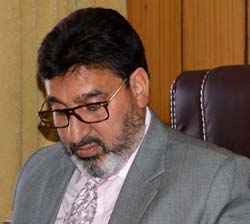SRINAGAR:
GST, the most talked about tax reform in history, has created a situation that now planners are fighting it out, publicly. West Bengal Finance Minister had a heated exchange with his J&K counterpart, Dr Haseeb Drabu, publicly.

West Bengal finance minister Amit Mitra while addressing the annual general meeting of FICCI on Thursday said that there was a revenue shortfall of Rs 39,111 crore within first four months of the GST rollout.
“September tax collection was Rs 95,131 crore. The October collection plummets by Rs 12,000 crore. Does the country know that? October collection was Rs 83, 346 crores. Is it a Rs 12,000 crore decline? So here’s the question on the table, what’ll happen next month, the following months?” Further, the minister pointed out that states are facing a revenue shortfall of Rs 39,111 crore in the first four months of the new regime,” The financial express quoted Amit Mitra saying.
The next issue he raised was a revenue shortfall of Rs 39,111 crore in the first four months of a rollout of the goods and services tax. In the GST council, the government had budgeted a revenue shortfall of Rs 55,000 crore. At the current rate, even if we see improvement, we will end up at Rs 80-85,000 crore,” he said. Amit Mitra also pointed out that the small and medium enterprises have been most hurt. “Why has it (collection) fallen? SMEs have not been able to fill in. There has been a 40% decline in production for a few SMEs,” Amit Mitra said.
Responding to the questions raised by Amit Mitra, J&K Finance Minister Haseeb Drabu said, “Who’s GST is this? Every single decision taken in the GST was by consensus. I may have many differences with the decisions, but that’s what consensus is all about. J&K is the only state which did not have the obligation to go with GST. I would certainly own up every single decision of the GST council.”
Haseeb Drabu said that since the tax reform is in a state of transition, there are bound to be challenged. “There is certainly lack of clarity and we are in transition,” Drabu said.

In the same address, Haseeb Drabu pointed out that there have been many gains from moving on to the new indirect tax regime. “The first gain from GST is that it’s India’s first truly federal institution. As a state finance minister, I feel hugely empowered. Previously, the planning commission would fix everything, we would have to fix our numbers to suit their requirements”.
The revenues may not have increased, but it has given the sub-national level a freedom which is unheard of,” Haseeb Drabu pointed out.
Drabu also said that the new regime has indeed empowered the states like never before. “For the first time, the union and the states have pooled their sovereignties. This can change the political economy of this nation. You had 29 different finance ministers contributing to it, and not for conceptual issues but even drafting it. I don’t think this would’ve happened anywhere in the world,” he said.
(This news story is based on a report that appeared in Financial Express)















